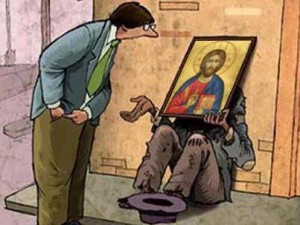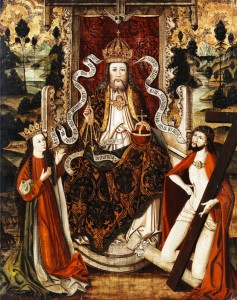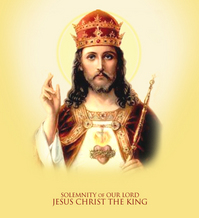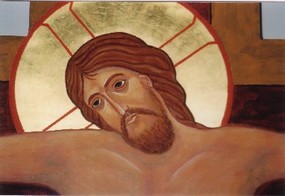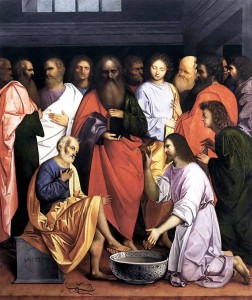 The 34th Sunday through the Church Year is known in the Ordinary Form of the Mass as the Solemnity Our Lord Jesus Christ, King of the Universe (today); the communities who use the Extraordinary Form of the Mass celebrated this feast on the last Sunday of October.
The 34th Sunday through the Church Year is known in the Ordinary Form of the Mass as the Solemnity Our Lord Jesus Christ, King of the Universe (today); the communities who use the Extraordinary Form of the Mass celebrated this feast on the last Sunday of October.
Pope Pius XI, in 1925, instituted this feast as a response to the rise of modern totalitarian states and growing secularism. We feel the effects of the ideology today. In the Pope’s mind, Christians were to keep their eyes focused on the goal of creation – the fullness of the Kingdom of God in a complete way through Jesus Christ. Consider what Saint Paul wrote to the Colossians: “He is the image of the invisible God, the firstborn of all creation; for in him all things in heaven and on earth were created, things visible and invisible, whether thrones or dominions or rulers or powers—all things have been created through him and for him.”
“The Son of Man ‘came not to be served but to serve’…that King whom to serve is to reign” Thus, the “‘state of royal freedom’ proper to Christ’s disciples: to serve means to reign!”
In Jesus of Nazareth, Holy Week, Pope Benedict wrote:
“Jesus performs for his disciples the service of a slave, he ’emptied himself’ (Phil 2:7).
“What the letter to the Phillipians says in it great Chrisotological hymn –namely, that unlike Adam who had tried to grasp divinity for himself, Christ moves in the opposite direction, coming down from his divinity into humanity, taking the form of a servant and becoming obedient even to death on a cross (cf. 2:7-8) — all that is rendered in a single gesture. Jesus represents THE WHOLE OF HIS SAVING MINISTRY IN ONE SYMBOLIC ACT. He divests himself of his divine splendor; he, as it were, kneels down before us; he washes and dries our soiled feet…” (p,56-7)
The image for today’s feast is Jesus washing the feet of Peter which demonstrates in a most profound way Jesus’ kenotic essence (kenosis means Jesus taking on human nature in a total way without sin and decay; you can think of the Lord’s Infancy narratives) thus representing his kingship in a new way rather with a crown (as is ofttimes the representation). Jesus could have easily come with earthly symbols of power and honor but according to his loving, merciful, kenotic reality he chose the very opposite.
And Saint Therese of Lisieux has an interesting way of pointing us: “Here on earth, where everything changes, only one thing doesn’t change: the King of Heaven’s way of acting as regards his friends. Ever since he raised up the standard of the cross, it is in its shadow that all must fight and gain the victory over ourselves.”
